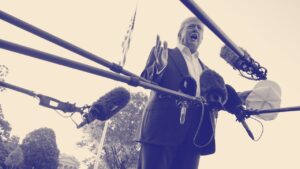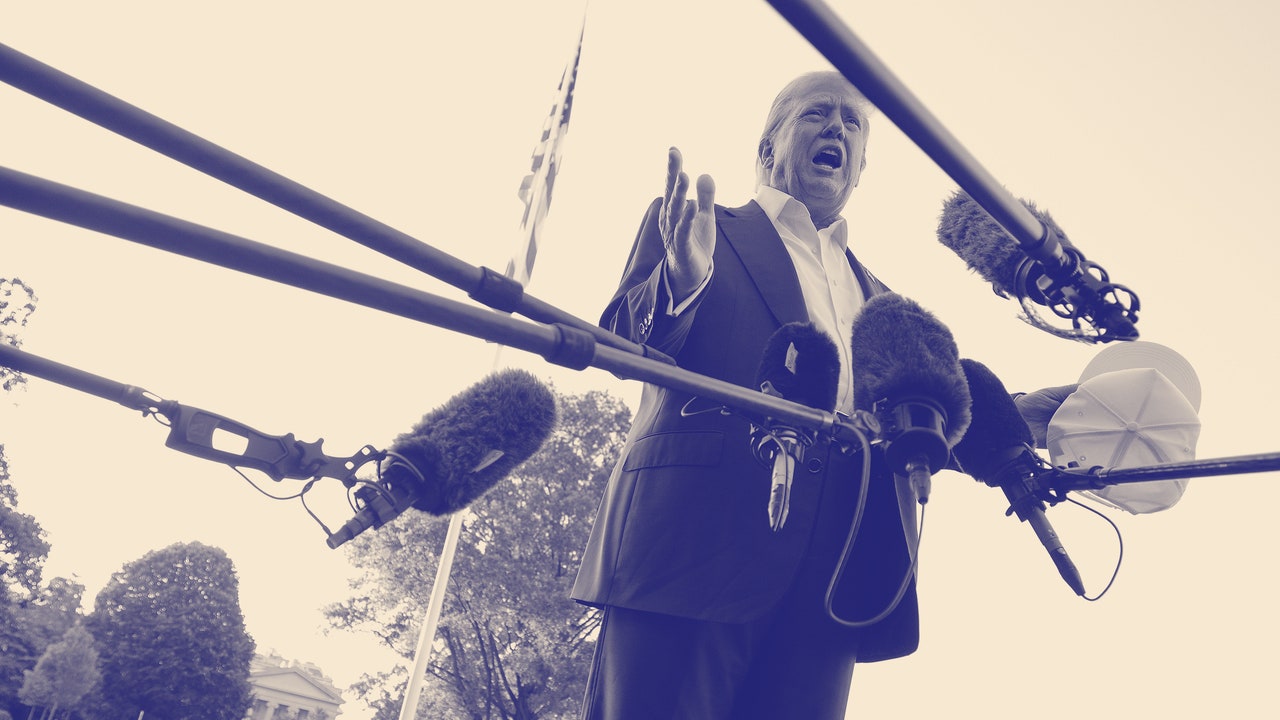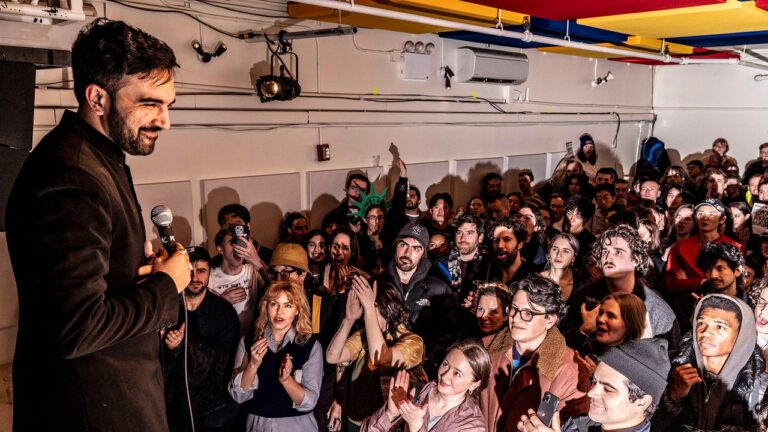On Monday night, forty-eight hours after President Donald Trump ordered a series of strikes on Iranian nuclear sites, he announced a ceasefire between Israel and Iran. Earlier that day, Iran had fired missiles at an American airbase in Qatar, an attack that came with advance warning and resulted in no casualties. The Trump Administration had initially signalled a reluctance to formally get involved in Israel’s campaign to destroy the Iranian nuclear program, but, since the strikes on Saturday, Trump had publicly mused about the possibility of regime change. Even after his Monday announcement that he’d helped broker a pause in hostilities, Iran and Israel continued to exchange missile attacks, each side accusing the other of breaking the terms of the ceasefire. On Tuesday morning, Trump told reporters at the White House, “We basically have two countries that have been fighting so long and so hard that they don’t know what the fuck they’re doing.”
Nicole Grajewski is a fellow at the Carnegie Endowment for International Peace’s Nuclear Policy Program, and the author of the book “Russia and Iran.” (On Monday, the Iranian foreign minister, Abbas Araghchi, met in Moscow with his country’s most powerful ally, Vladimir Putin, who had criticized the American strike.) Grajewski and I spoke just prior to the ceasefire announcement, and followed up after Trump’s declaration. Our conversation, edited for length and clarity, is below. In it, we discuss why a ceasefire may be difficult to sustain, what Russia’s relationships with both Iran and Israel may portend for the region, and why a war meant to end Iran’s nuclear program may instead have delivered prolonged uncertainty.
What are your concerns about a ceasefire holding in the short, medium, and long term?
In the short term, I think my primary concern is accidental escalation. Whether that’s Iranian proxy groups in Iraq launching something against Israel and Israel responding, or because of a response to statements from Israel or Iran. In the medium to long term, my concern has to do with the acrimonious relationship between Iran and Israel which would likely continue. This ceasefire is not going to eradicate years of shadow war that Iran and Israel are locked into. And the nuclear issue continues to loom.
How so?
On Monday, the National Security and Foreign Policy Committee of the Iranian parliament approved an outline of a bill that would suspend Iran’s coöperation with the International Atomic Energy Agency. That would curtail efforts at identifying, or at least accounting for, Iran’s stockpile of highly enriched uranium and access to these nuclear sites. So there may be momentum within Iran that seems to be pushing against international oversight on its nuclear program.
Netanyahu has also been very aggressive lately—could you see him giving Trump a victory on a short-term ceasefire, as he did with Gaza, and then wanting to re-start the war?
It’s very foreseeable that Israel takes the opportunity again to go in and eliminate certain facilities or leadership. I think a lot of the escalatory dynamics probably hinge on what is left of the Iranian nuclear program and how close they are to reconstituting. Some of the uranium metal facilities have been destroyed, so that’s actually a pretty good stopgap for some of the weaponization work. But we don’t know where the highly enriched uranium that Iran had is. And then Iran has a lot of components of centrifuges, and these haven’t been under I.A.E.A. inspection since 2021. So, on the long-term side of it, you could see Iran developing a covert program. Moreover, because you did see Israel assassinating Iranian scientists in the past, Iran created a pretty robust community of nuclear scientists, nuclear engineers, nuclear physicists, so that continuity of knowledge would be maintained. So it’s not like the knowledge is eradicated either. And I think one thing that’s going to happen as a result of the mass intelligence penetration that really curtailed Iran’s military response and led to this destruction of their Islamic Revolutionary Guard Corps (I.R.G.C.) leadership, is that there’s going to be a higher-surveillance state, a higher clampdown at a societal level, and, I think, a far more secretive program.
What internal and external dynamics do you see within Iran right now?
There is a domestic audience to whom the Iranian leadership wants to convey a semblance of stability and a semblance of strength. But this is also about signalling to the United States that Iran is not weak and that, despite these massive hits when it comes to their military facilities, when it comes to their conventional power they still reserve a right to respond. But it seems that there was some warning or signalling to America and/or Qatar before this Qatar military-base attack. Iran likely doesn’t want to get involved in a war of attrition with the United States, even if they are preparing for one.
So the signalling is just to make clear that a prolonged war is not what Iran wants?
Yeah, and there’s obviously now this concern about regime change and internal stability. And so that’s going to be something, I think, that Iranian strategists are thinking about as well, because the continuation of this war for them also increases their vulnerability when it comes to the kind of control that they have at home. Israel on Monday targeted some of the organs of repression within Iran, such as the so-called Basij force, for example, and other parts of their internal security services.
Can you talk a little bit about how the regime is structured and operates?
The regime functions on repression, and terror to an extent. That’s how it was formed in this revolutionary context and then after the Iran-Iraq War. But it’s heavily bureaucratized and also institutionalized. And the Islamic Revolutionary Guard Corps is one aspect of this. And one part of that is the Basij, which is their internal clamp on power. But they also have major conglomerates of economic interests that are really predicated on corruption. And it is factionalized. There are certain factions where you have the clergy and that emphasis in just certain parts of the country. So in Qom, for example, that’s a pretty large concentration of power when it comes to the clergy. And so you see that in discussions of the Guardian Council, which oversees elections and approves legislation, or even with succession talk. But then there’s also these hard-liners who are very much entrenched in this ideology of confrontation with the United States and Israel. And this also includes a very strong emphasis on maintaining at least this kind of threshold nuclear status and also projecting its power throughout the region.
So Iran functions as somewhat of a kleptocracy, but also a heavily ideological one. And, of course, this is all driven by an acute sense of vulnerability to any kind of internal or external upheaval that might threaten the very existence of the regime. And, of course, there’s a Supreme Leader, and he is the ultimate arbitrator within Iran, but there’s a cadre of élites around him.
I have seen you warn about the consequences of regime change. What about this regime’s structure that you have just broadly defined makes you concerned specifically?
One problem with the discussion of Iranian regime change in the United States is that it’s a goal within itself, but there is nothing with what happens after. The experience of Iraq is a good example of this. But with Iran, I think what’s worrisome is that there are such strong and also militarized factions that could potentially mount somewhat of a countercoup. The Iranian people mostly don’t support the current regime, and many Iranian people don’t support a revolutionary theocracy. But there are also the people who are actually in charge of this massive repression apparatus. And so one of my concerns is also that we pursue a policy of regime change, and what actually happens domestically in Iran is far greater repression and far more insecurity to the extent that the civilians are the ones who suffer the most. Regime change is ultimately up to the Iranian people. One would hope that this regime does fall at some point and some democratic government rises. But, you know, that’s not always how international relations play out.
How do you think the weakening or removal of Iran’s allies, whether Hezbollah after the Israeli campaign against it, or Syria after Assad’s fall, has changed Iran’s calculations?
The changing regional dynamics and the loss of Iran’s forward-defense doctrine, which is what they called it, which had provided them with strategic depth, will probably influence the response a lot. For instance, this is why Iran has so far been reliant on its missile force to serve as a deterrent or at least its retaliatory capability toward Israel. But it also, I think, ultimately shows, if you look at the debates within Iran, a failure of what they thought their defense strategy was over the years. They invested so much money in these groups that in some cases eventually turned out to succumb to almost overnight collapse. And then, of course, Assad in Syria as well. Among the so-called reformists, you would hear criticism of all this spending, especially around the time of the Syrian war. You had parliamentarians questioning why Iran is investing so much in these wars abroad when there’s endemic problems at home. But I think Iran’s retaliation shows the failure of that strategy. But if Hezbollah was stronger and Assad was there, they probably would have been able to mount a much more devastating response or a much more damaging response than they were able to.
How did the regime adjust its behavior after the nuclear deal, before Trump pulled out of it?
The nuclear issue was really about Iran’s fissile material, about its work with advanced centrifuges and the ability for Iran to potentially break out with a nuclear weapon. So I wouldn’t say the deal fundamentally changed the regime’s behavior. You saw Iran quite active in Syria at the time. That’s really when they increased a lot of their support for the Assad regime, after the nuclear agreement, and you saw Iranians supporting non-state actors throughout the region with targeted assassinations. So I wouldn’t say that the nuclear deal transformed the regime or even really prompted that much of a shift. Perhaps it pushed things underground. I think there was actually somewhat of an effort by the leadership to portray themselves as behaving on the international stage. But it didn’t shift their calculus about their security and it didn’t really shift the internal dynamics because you saw the same level of repression, you saw the same level of support for these groups. And it didn’t eradicate the discourse about Iran being a perpetual enemy to Israel and a perpetual enemy to the United States. It was really about the nuclear program. Maybe we had illusions about whether that would change the calculus of the regime. But, in reality, I think that the nuclear deal was helpful because at least we had greater transparency about what they were doing. And now this is going to be all shrouded in secrecy.
I want to turn to Iran and Russia now, but, before we do, how would you describe their relationship over the past several decades?
The relationship has never really been an easy one. After the collapse of the Soviet Union, the Russians came into Iran to secure some arms agreements and civilian nuclear-energy coöperation. But they faced quite a bit of pressure from the United States to cancel some of these agreements. And you’d see the Russians really preferring to coöperate with the United States over Iran. And this also happened during the height of the Iran nuclear issue, prior to the 2015 nuclear deal that Obama made, when there were rounds of sanctions on Iran. Russia supported this. Around 2010 was when the Russia-Iran relationship was at its lowest, though, with Russia voting for probably the most stringent and damaging sanctions on Iran when it came to its economy and also a conventional arms embargo. And this even prompted former President Mahmoud Ahmadinejad to call Russia an enemy of the Iranian people and accuse them of caving to Satan. So their relationship wasn’t this close, tight-knit relationship at the time, though they still coöperated.
It was really the Syrian civil war that transformed this relationship. Both had ties to the Assad regime, but they also saw the spectre of what they viewed as Western-led regime change, akin to Libya. And it prompted them both to bolster Assad and keep him afloat. And eventually this culminated in the Russian intervention in 2015. And that transformed the Russia-Iran relationship because for the first time they had to operate in the same military campaign. They had to create structures and institutions and different channels for coöperation. And there were tensions in Syria. Russia and Iran had competing interests. They would sometimes vie over certain contracts. But what happens as a result of Syria is you see a deepening in the institutionalization of this relationship. And it goes beyond that. There is more coöperation when it comes to their intelligence services, when it comes to their interior ministries, and even on issues like sanction evasion.
What role has Iran played in the war in Ukraine?
When Russia seemed to be faltering in the war in Ukraine, they reached out to the Iranians for drones. And Iran provided drones initially. And, eventually, Russia shifted to local production of these drones. And a lot of the individuals who were involved in the Syrian campaign actually were behind the deals with the Russians. And so you see this relationship transforming into something much deeper, where Russia now was dependent on Iran. That’s changed a bit because of the localization. And Russia doesn’t necessarily need Iran for drone components anymore. But Iran was really crucial in that regard, of establishing these factories and providing Russia with munitions to terrorize Ukrainians every night.
How have the Russians responded to the Israeli attack on Iran and to Trump’s strikes?
Russia has come out with strongly worded statements supporting Iran and calling the aggression illegal. Russia has attempted to mediate and tried to use this as a way of de-escalating, though Russia doesn’t really have much legitimacy as a mediator at the moment because of the downturn in Russian-Israeli relations. At the same time, Russia does have a quite large ethnic-Russian population in Israel. So this hasn’t been a blanket endorsement of Iranian actions. And Russia doesn’t seem to be coming in to provide any formal military assistance to Iran. But Russia is trying to lean a little bit closer to Iran.
I imagine they don’t want to get too involved, in part because they are already stretched thin in Ukraine, no?
Yeah, the question is, what can Russia do? There was a bunch of analysis saying that Russia abandoned Iran, but in reality the question should have been, like, what could Russia have done? Russia’s defense industry is already strapped. It’s not clear if the Iranians have asked the Russians for help. There’s probably some coöperation when it comes to intelligence. At the meeting on Monday in Moscow, the head of Russia’s military intelligence was there. And I think that was an effort to signal that Russia may be helping Iran in terms of intelligence coöperation, but also to maybe assuage some Iranian concerns that Russia is not doing enough.
What about in terms of Russia’s relationship with Israel? Ideologically, it makes a certain amount of sense, and Netanyahu’s closest ally in Europe might be Hungary, which is close to Russia. Why didn’t this relationship develop more?
Putin and Netanyahu had a pretty good personal relationship, and that was even evident during Putin’s second Presidency in the two-thousands. So they’ve had a pretty strong relationship. Obviously, the Soviet Union didn’t have great relations with Israel, but, actually, on a personal level, Putin and Netanyahu had pretty close ties.
It’s nice to see two guys like that come together.
Yeah. In the Syrian civil war, the Russians and the Israelis had a pretty strong relationship. They had a deconfliction hotline. Russia would actually sometimes acquiesce to Israeli strikes on Iranian assets. And so they had a pretty strong working relationship. However, after the invasion of Ukraine and the closer coöperation with Iran, the Israelis mounted their concerns, and the Russians weren’t really open to that. And then, after October 7th, it became far worse because Russia barely even condemned the attack, but hosted Hamas delegations in Russia. And then, all the while, there were actually more aggressive moves in Syria, such as electronic jamming against Israel, that really led this relationship to sour. And I think what was surprising was, when Iran launched strikes in October of 2024 against Israel, Putin didn’t even bother calling Netanyahu. The Kremlin said that it had no intention to speak to the Israelis. However, with this round of strikes, almost immediately Putin tried to de-escalate and called both Netanyahu and the Iranian President Masoud Pezeshkian to try to serve as a mediator. So it perhaps reflects how Russia thinks the situation might be quite grave.
Yeah, it is interesting that it soured, because I remember Netanyahu being basically non-aligned on Ukraine and praising Putin.
Yeah, and there is also the Jewish Russian diaspora, and the Jewish population within Russia. Putin kept the lid on antisemitism in Russia for a while. But, after October 7th, it changed.
Going forward, if this conflict is going to be contained, what are you looking at in terms of alliances and regional dynamics?
It is really an issue between the U.S. and Iran and Israel right now. However, that could widen, and you could see Russia trying to exploit the situation as a form of horizontal escalation with the United States. The question is what form would that be? But Russia could be there as a spoiler. At the moment, they seem to be less willing to do that, because I do think that the Russians are concerned about the survival of the Iranian regime, but that could change. The Russians have shown quite a bit of flexibility when it comes to certain policies.
At the same time, I think that the regional dynamics are quite dire. There are still non-state actors that are aligned with Iran in Iraq, which could be activated and open up another front targeting U.S. bases, and there are the Houthis in Yemen. And then, of course, there’s always the Gulf countries that are in the middle of this, and Iran has thus far been clear in signalling to them and keeping communications open, but that could also deteriorate. One thing that I am also quite concerned about is Iran’s thinking on the nuclear issue. We now know that Iran has moved or diverted some of its highly enriched uranium or perhaps some of its centrifuge components from the Fordow site that was bombed by America. It is all quite murky, but the situation doesn’t look incredible at the moment. ♦







